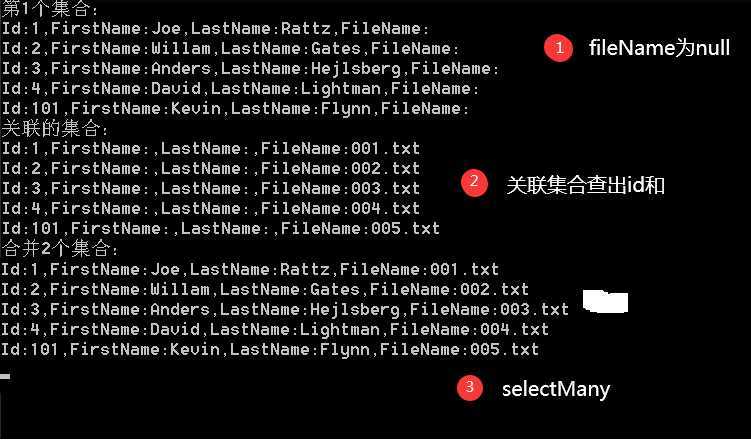
public class Employee
{
public int Id { get; set; }
public string FirstName { get; set; }
public string LastName { get; set; }
}
public class EmployeeFile
{
public int EmployeeId { get; set; }
public string FileName { get; set; }
}
public class EmployeeDTO
{
public int Id { get; set; }
public string FirstName { get; set; }
public string LastName { get; set; }
public string FileName { get; set; }
}
static void Main(string[] args)
{
List<Employee> employees = new List<Employee>()
{
new Employee {Id = 1, FirstName = "Joe", LastName = "Rattz"},
new Employee {Id = 2, FirstName = "Willam", LastName = "Gates"},
new Employee {Id = 3, FirstName = "Anders", LastName = "Hejlsberg"},
new Employee {Id = 4, FirstName = "David", LastName = "Lightman"},
new Employee {Id = 101, FirstName = "Kevin", LastName = "Flynn"}
};
List<EmployeeFile> employeeFiles = new List<EmployeeFile>()
{
new EmployeeFile {EmployeeId = 1, FileName = "001.txt"},
new EmployeeFile {EmployeeId = 2, FileName = "002.txt"},
new EmployeeFile {EmployeeId = 3, FileName = "003.txt"},
new EmployeeFile {EmployeeId = 4, FileName = "004.txt"},
new EmployeeFile {EmployeeId = 101, FileName = "005.txt"}
};
var result =
(from e in employees
join d in employeeFiles on e.Id equals d.EmployeeId
select new EmployeeDTO { Id = e.Id, FirstName = e.FirstName, LastName = e.LastName, FileName = null }).ToList();
Console.WriteLine("第1个集合:");
foreach (var item in result)
{
Console.WriteLine($"Id:{item.Id},FirstName:{item.FirstName},LastName:{item.LastName},FileName:{item.FileName}");
}
var objs = (from r in result
join d in employeeFiles on r.Id equals d.EmployeeId
select new EmployeeDTO
{
Id = r.Id,
FileName = d.FileName
}).ToList();
Console.WriteLine("关联的集合:");
foreach (var item in objs)
{
Console.WriteLine($"Id:{item.Id},FirstName:{item.FirstName},LastName:{item.LastName},FileName:{item.FileName}");
}
var objs2 = objs.SelectMany(d => result, (d, r) =>
{
EmployeeDTO dto = r;
if (r.Id == d.Id)
{
r.FileName = d.FileName;
return dto;
}
else
{
dto = null;
}
return dto;
}).Where(n => n != null).ToList();
Console.WriteLine("合并2个集合:");
foreach (var item in objs2)
{
Console.WriteLine($"Id:{item.Id},FirstName:{item.FirstName},LastName:{item.LastName},FileName:{item.FileName}");
}
}
LINQ SelectMany代替for循环赋值,把联合查询的值赋值给第1个集合
原文:https://www.cnblogs.com/tangge/p/12635415.html